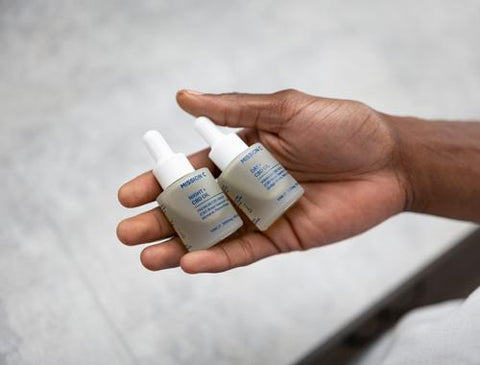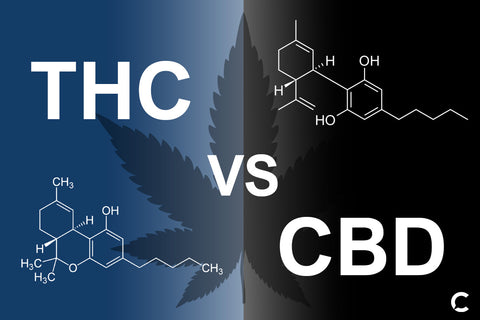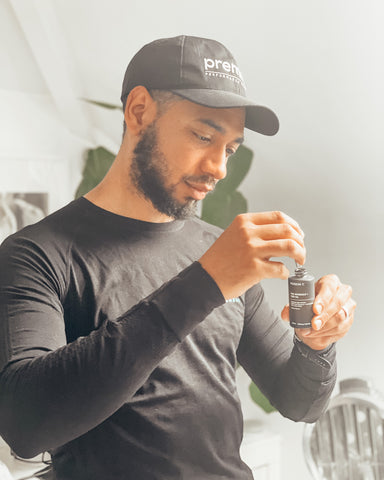Table of Contents
- What is CBD?
- The Difference Between CBD and THC
- How CBD Oil Works in the Body
- So, Is CBD Oil Addictive?
- Research on CBD Oil Addiction
- Factors Influencing CBD Addiction
- Managing CBD Oil Usage
- The Marvellous Benefits of CBD Oil
- Side Effects of CBD Oil
- Legal Status
- Final Thoughts
- CBD Oil Addiction FAQs
It should come as no surprise that CBD oil has gained significant popularity lately, with approximately 1.3 million people in the UK participating in regular use of CBD to boost physical and mental health. Furthermore, a 2020 poll found that a staggering 38% of the British population, equivalent to more than 17.4 million individuals, would consider using CBD oil to better manage their health.
If you’re one of the many Brits considering adding CBD to your wellness routine, you might have questions about its safety, potential side effects and the most effective ways to incorporate it into your daily life. So, exactly is CBD, and is it safe to use? Is it possible for regular use of CBD to lead to addiction? In this article, we will explore the nature of CBD and its addictive potential.
What is CBD?
CBD, or cannabidiol, is a naturally-occurring compound which can be extracted from the cannabis plant. It belongs to a group of health-boosting chemicals known as cannabinoids, which interact with the mammalian endocannabinoid system (ECS) to regulate various physiological processes. As a result, cannabinoids can have an incredibly positive influence on our mood, sleep, stress response, pain perception, inflammation levels and immunity. Unlike tetrahydrocannabinol (THC), another cannabinoid found in cannabis, CBD does not have psychoactive effects and does not produce a "high" sensation.

CBD is available in a variety of different forms and is simple to add to your daily routine. Additionally, cannabidiol has a high safety profile and therefore is an increasingly popular choice for those looking to improve overall health and vitality.
The Difference Between CBD and THC
CBD and THC are the two most well-known cannabinoids present in cannabis plants. While both have therapeutic properties, they differ in their effects on the body. THC is the compound responsible for the intoxicating effects associated with marijuana use, so when you hear about people getting ‘high’ from marijuana or cannabis use, this refers to the presence of the THC cannabinoid. On the other hand, CBD does not produce the same psychoactive effects, making it an appealing option for individuals seeking therapeutic benefits without the mind-altering effects.
Read More: CBD vs THC

|
THC and CBD have the exact same molecular formula. However, the atoms are arranged slightly differently, giving the compounds different chemical properties which results in the cannabinoids affecting your body differently when ingested. |
How CBD Oil Works in the Body
CBD interacts with the endocannabinoid system (ECS) in the mammalian body, essentially mimicking the body’s own ‘endocannabinoids’ (natural compounds within the body), and playing a crucial role in maintaining balance and homeostasis. Endocannabinoids naturally interact with the ECS receptors which are found throughout the central nervous system and peripheral nervous system. When CBD is consumed, it can also interact with these receptors, particularly receptors known as CB1 and CB2, to promote overall wellbeing.
So, Is CBD Oil Addictive?
Research suggests that CBD is not addictive on its own, and it does not stimulate the brain's reward system in the same way as addictive substances, making it unlikely to lead to addiction.
There is a common misconception that CBD oil is addictive, which probably derives from its association with the cannabis plant. While marijuana is known for its psychoactive properties and potential for addiction (which we now understand is actually due to its THC content), CBD is a distinct compound that does not induce intoxication or the "high" commonly associated with marijuana use. The confusion arises from the fact that CBD is derived from the cannabis plant, leading some to wrongly assume that it shares the addictive properties of marijuana/THC.
Research on CBD Oil Addiction
Extensive research has been conducted to explore the addictive potential of CBD oil. Several studies have indicated that CBD may even have therapeutic properties for addiction treatment. For example, research has shown that CBD can help reduce drug cravings and withdrawal symptoms in individuals addicted to substances such as opioids.
Factors Influencing CBD Addiction
While CBD itself is not addictive, it’s important to note that certain factors can contribute to the potential for addiction-like behaviours. These factors include:
- Impure Products. CBD oil products that contain high levels of THC or other harmful substances can increase the risk of addiction. In the UK, CBD-based products should not contain more than 0.2% THC content. If they do, they are illegal. Always check the label carefully.
- Underlying Addiction Issues. Those with a history of addiction may be more prone to developing addictive behaviours with any substance.
- Psychological Factors. Emotional or psychological factors such as stress, anxiety or depression can influence addictive behaviours, regardless of the substance being used.
Managing CBD Oil Usage
To ensure the responsible use of CBD oil, we recommend firstly consulting with your GP. Seeking guidance from a healthcare professional can help individualise your CBD treatment plan and determine the appropriate dosage based on your personal needs. Your doctor will also check that CBD oil will not interfere with any medications already being taken. Before purchasing CBD, check that the source is reputable. Are their labels accurate? Is it a high-quality product? Reputable manufacturers will always have CBD products independently lab tested for purity and lab reports should be transparent and easily accessible.
Carefully read the product instructions provided by the manufacturer and follow them accordingly. If you’re new to CBD oil use, we also recommend beginning with a low dose and building up gradually, while monitoring your personal response. You can make adjustments accordingly as time goes on and as you evaluate the effects on your body. Read the in
The Marvellous Benefits of CBD Oil
So now you know how to safely consume CBD and that addiction to the cannabis compound is highly unlikely, but what incredible benefits can you expect once CBD is added to your routine?
The cannabinoid has shown promising potential in providing various wellness benefits, including:
- Pain Relief - CBD may help alleviate chronic pain by interacting with receptors in the ECS and reducing pain perception, enabling you to feel rejuvenated and ready to take on the day.
- Anxiety and Stress Reduction - CBD oil has been studied for its potential to reduce anxiety and stress levels, promoting a sense of calmness. Many users report clarity of mind and better focus, thanks to a reduction in overwhelming, anxious thoughts contributing to mind clutter.
- Improved Sleep - CBD may aid in improving sleep quality and addressing sleep disorders such as insomnia, thanks to its potent relaxation and calming ability.
- Anti-Inflammatory Effects – Research has shown that CBD possesses anti-inflammatory properties that may benefit individuals with inflammatory conditions, improve immune response and help with post-workout muscle recovery, for example.
- Neuroprotective Properties – Further human-based trials are necessary, but CBD oil has been investigated for its potential neuroprotective effects in various neurological disorders.
Read More: 6 Signs Your CBD is Working

Side Effects of CBD Oil
While CBD oil is generally very well-tolerated, it may cause some mild side effects, including:
- Dry mouth
- Drowsiness
- Nausea
- Changes in appetite
- Diarrhoea
However, these side effects are rare, typically mild and temporary. If you do experience any adverse side effects, we recommend taking a break immediately and when reintroducing CBD to your routine, using a lower dose.
Legal Status
Cannabidiol is legal in the UK, but the legal status of CBD varies across different countries and regions. As we mentioned earlier, CBD products can be legally sold in the UK provided the THC content is 0.2% or lower. Low THC levels ensure that the user will not feel any psychotropic effects. Many CBD-infused products in the UK are completely THC-free (always check the label).
Final Thoughts
We have learned that CBD oil is not addictive on its own, and the misconception surrounding CBD and addiction stems from its association with the cannabis plant and marijuana. However, THC – a primary compound in marijuana – is a controlled substance that causes mind-altering effects and is sometimes associated with addiction.
By following safe consumption practices and seeking guidance from their doctor if necessary, individuals can use CBD oil responsibly and maximise its potential extraordinary wellness-enhancing benefits.
Looking to overhaul your health with the aid of a high-quality, organically-sourced CBD oil? Take a look at our range of CBD-infused oils for mental health and physical wellness.
Related Articles
- What is Delta-8 THC?
- Science-Backed CBD Advantages
- How to Take CBD Oil
- Is Delta-9 THC Legal in the UK?
CBD Oil Addiction FAQs
What happens if I stop taking CBD oil?
If you choose to stop using CBD, you may no longer experience the positive benefits you were previously enjoying. However, it's important to note that CBD withdrawal does not typically cause any significant withdrawal symptoms. CBD's gentle interaction with the body’s endocannabinoid system ensures that any changes you might encounter after discontinuation are generally mild, manageable and not a cause for concern.
Can I overdose on CBD oil?
While it is highly unlikely that you will overdose on CBD, which has been described by the WHO as adopting a good safety profile, it is important to follow the recommended dosage as indicated on your product packaging. If unsure, arrange to speak to your doctor.
Can CBD oil help with addiction treatment?
There is growing evidence to suggest that CBD oil may have therapeutic properties for addiction treatment, for example, helping to potentially reduce cravings and unpleasant withdrawal symptoms.




















